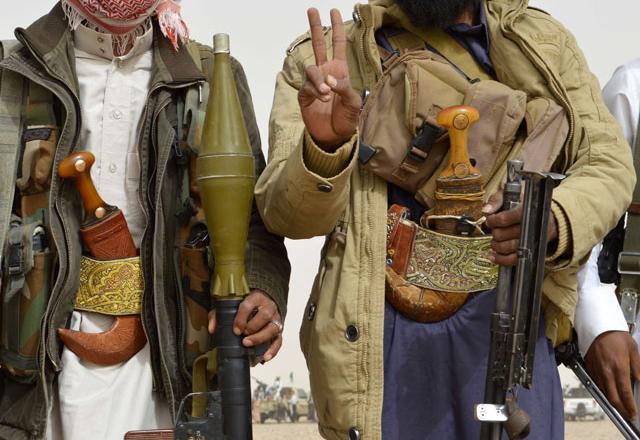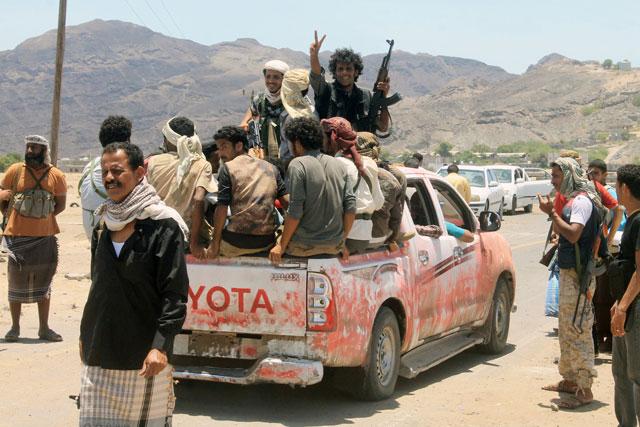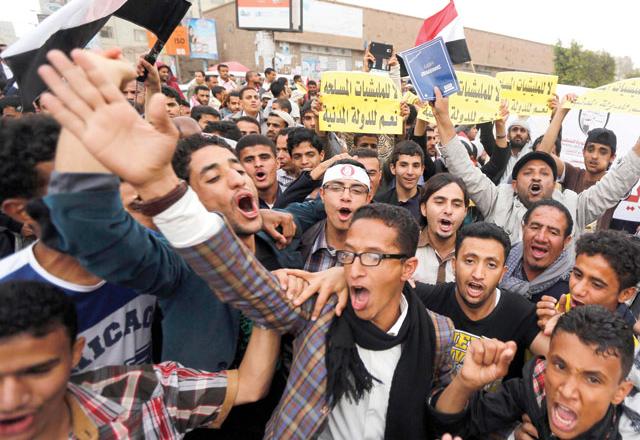You are here
Shiite rebels say Yemen President Hadi ‘wanted for justice’
By AP - Feb 24,2015 - Last updated at Feb 24,2015

SANAA — Yemen's Shiite rebels said Tuesday that President Abed Rabbo Mansour Hadi, who fled the rebel-controlled capital earlier this month and has begun reconstituting his authority in the south, is "wanted for justice”.
The move escalated a crisis that threatens to split the Arab world's poorest country between the Houthi rebels, who control the capital Sanaa and much of the north, and Hadi, who enjoys wide support in the formerly independent south.
The growing chaos also threatens to undercut US efforts to combat Yemen's powerful Al Qarda affiliate, which has been linked to several failed attacks on the United States and claimed responsibility for the attack on a French satirical magazine last month.
In the latest sign of the country's growing lawlessness, a Frenchwoman working for the World Bank was kidnapped Tuesday in front of a ministry building in Sanaa, where several Western countries, including France, have shuttered their embassies. No one claimed responsibility for the abduction.
The rebel-run state news agency SABA quoted the Houthis' Revolutionary Committee as saying that they are monitoring the "suspicious" activities of Hadi. It did not say whether a formal arrest warrant has been issued.
The group says Hadi's "reckless and erratic actions harmed the Yemeni people," and called on the international community to consider him a fugitive from justice.
The group also warned state employees and even diplomatic missions against dealing with Hadi as president, saying they would be “held accountable”.
The Houthis hail from the Shiite Zayidi minority, which makes up about a third of Yemen’s population, and swept down from their northern strongholds last year, seizing the capital in September.
Last month, the rebels seized the presidential palace and placed Hadi, his prime minister and the Cabinet under house arrest, demanding political concessions. Hadi and his government resigned in protest.
The rebels then finalised their takeover by dissolving parliament and declaring their Revolutionary Committee to be the country’s highest political body.
Last week Hadi fled to Aden, where he retracted his resignation and declared himself the country’s legitimate leader. He has since been holding meetings with tribal leaders, security officials and members of the dissolved parliament.
On Tuesday, he replaced the intelligence and police chiefs in Aden as part of a shake-up to remove supporters of former president Ali Abdullah Saleh, now allied with the Houthis, according to security officials. The officials spoke anonymously because they were not authorised to brief the press.
On Tuesday, Hadi ordered the defence ministry to move the army’s headquarters to Aden and to take orders only from him. But with the army in shambles, divided over tribal and political loyalties, it’s not clear how much power Hadi has over the troops.
The United Nations Security Council was, meanwhile, expected to pass a new resolution against the Houthis and Saleh. Last year, the council imposed sanctions on Saleh and two Houthi leaders.
On Monday, the Houthis warned Prime Minister Khaled Bahah and his cabinet — all of whom resigned when Hadi did — to return to their posts or face arrest. Houthi militiamen prevented one minister from fleeing to Aden on Monday.
Abdel-Azizi Al Gobari, the leader of a small anti-corruption party who met with Bahah on Tuesday, said the prime minister would only take orders from Hadi.
Al Qaeda in the Arabian Peninsula, as the Yemeni franchise is known, meanwhile held a meeting with tribal leaders in the southern Shabwa province, a militant stronghold, an Al Qaeda member told The Associated Press.
The Houthis have battled Al Qaeda’s Yemeni branch and vowed to destroy the group, but the rebels also employ hostile rhetoric towards the West. The Houthis are widely believed to receive Iranian backing, though they deny such allegations.
A tribal source in Beihan confirmed the talks, in which he said tribal leaders had warned the jihadi group not to drag them into a war with the Houthis. The tribal source and the Al Qaeda member spoke on condition of anonymity because they were not authorised to speak to the media.
Related Articles
Al Qaeda seized control of a major airport, a sea port and an oil terminal in southern Yemen on Thursday, consolidating its hold on the country's largest province amid wider chaos pitting Shiite rebels against forces loyal to the exiled president and a Saudi-led air campaign.
Yemen's Shiite rebels on Monday threatened to arrest and try for treason the prime minister and all Cabinet members if they fail to return to work, as thousands of Yemenis took to the streets in the capital, Sanaa, to denounce the rebel power grab.
RIYADH —Yemen's premier was in Riyadh on Monday to meet President Abed Rabbo Mansour Hadi and the Saudi-led coalition backing their administ
















